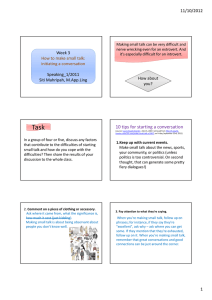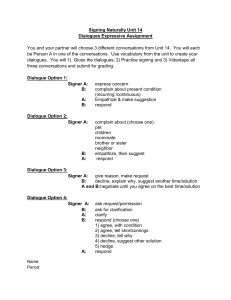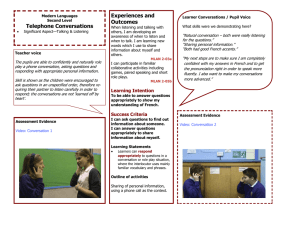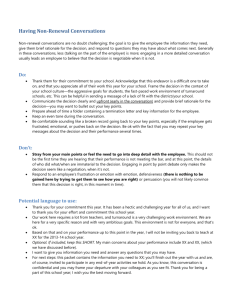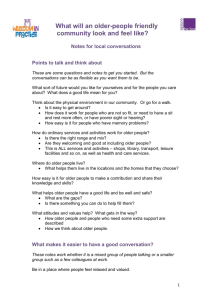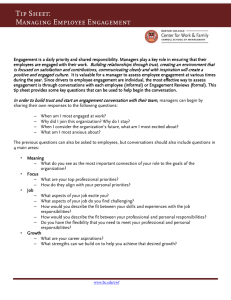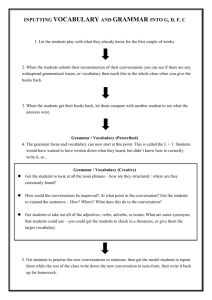Promoting Harmony – Facilitating Resolution – Celebrating Diversity
advertisement
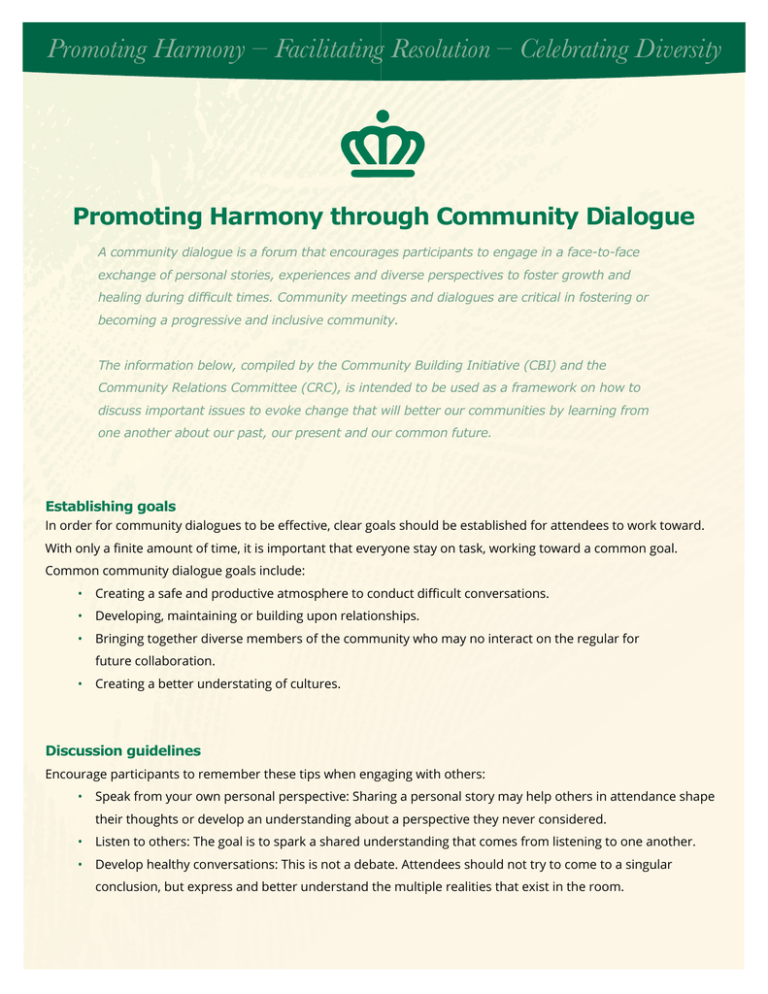
Promoting Harmony – Facilitating Resolution – Celebrating Diversity Promoting Harmony through Community Dialogue A community dialogue is a forum that encourages participants to engage in a face-to-face exchange of personal stories, experiences and diverse perspectives to foster growth and healing during difficult times. Community meetings and dialogues are critical in fostering or becoming a progressive and inclusive community. The information below, compiled by the Community Building Initiative (CBI) and the Community Relations Committee (CRC), is intended to be used as a framework on how to discuss important issues to evoke change that will better our communities by learning from one another about our past, our present and our common future. Establishing goals In order for community dialogues to be effective, clear goals should be established for attendees to work toward. With only a finite amount of time, it is important that everyone stay on task, working toward a common goal. Common community dialogue goals include: • Creating a safe and productive atmosphere to conduct difficult conversations. • Developing, maintaining or building upon relationships. • Bringing together diverse members of the community who may no interact on the regular for future collaboration. • Creating a better understating of cultures. Discussion guidelines Encourage participants to remember these tips when engaging with others: • Speak from your own personal perspective: Sharing a personal story may help others in attendance shape their thoughts or develop an understanding about a perspective they never considered. • Listen to others: The goal is to spark a shared understanding that comes from listening to one another. • Develop healthy conversations: This is not a debate. Attendees should not try to come to a singular conclusion, but express and better understand the multiple realities that exist in the room. Discussion processes & guidelines Below are recommendations on how to ensure that your discussion is effective. Suggested Time • 60 – 90 minutes or longer if time is available Suggested Audience • An intact or assembled group • 10-12 individuals • In larger groups, divide into smaller groups so that everyone can participate. Suggested Logistics • Ideally, sit in a circle of chairs or at small tables to allow for more intimate conversation • Provide a copy of the PDF included blow for guidelines • Provide paper, pens/pencils or additional resources as needed. Guidelines for facilitators Identify or recruit someone within your community to assist in facilitating the conversation. This person will be responsible for ensuring that conversations are constructive and meeting goals are achieved. The following guidelines are provided to ensure that everyone is encouraged to participate in a healthy and respectful dialogue. • Share the purpose of the dialogue and discussion guidelines. • Ask participants to reflect on questions in silence before answering (2-5 minutes). Participants may write down responses, but it should not be required. A few moments of silent reflection, however, are crucial. • Take questions one at a time and let each person respond before moving to the next question. These questions offer a way to engage on a personal level before discussing what is happening at the community level. This helps to increase understanding among group members. • When possible, stay with the questions as listed, but consider asking follow-up questions as needed. • Make sure everyone has a chance to speak and intervene as necessary when someone speaks too long or beings to offer solutions. Encourage speaking from a personal perspective rather than sharing the opinions of others. • Encourage authentic personal sharing and ask attendees to listen and give space to others. • Summarize, paraphrase and ask follow-up questions when appropriate. • You may not get to discuss all the questions; this is okay. • In closing, ask participants how listening to others has increased their understanding of their community, the topic at hand or what they have discovered about themselves through the process. Key questions to ask for reflections and conversation Below are sample questions to spark conversations amongst the group and set the tone and context for the dialogue. 1. How are you feeling about (insert topic)? What about your own identity (race, gender, etc.) and your personal story inform these feelings? 2. What early experiences have shaped your feelings and/or attitude about this topic/subject? 3. Who do you most identify with in this story? Why? Who do you least identify with? Why? What does this have to do with your identity and personal story? 4. What has been stirred up for you as a result of today’s conversation? 5. What are the barriers that make it difficult to address the issues surrounding this topic? 6. What is each of us willing to do individually to make a difference? 7. In addition to steps taken individually, how can we work together to improve relations. 8. As a result of today’s conversation, what is a possible next step for you? Options for next steps Conversations are the first step toward building relationships within your community. Be sure to establish future actions or dialogues that support working toward your established goals. This can be done by: • Broadening the conversation to include others within your group or organizations. • Request support or assistance in having additional conversations like this. It is recommended that groups engage an experienced facilitator to guide the conversation. If support is needed to identify a facilitator, please contact the Community Building Initiative and/or the City of Charlotte’s Community Relations Committee. For additional support and resources contact: • Dianne English, Community Building Initiative (CBI) Director - CBI@CBIcharlotte.org • Willie Ratchford, Community Relations Committee (CRC) Director - INFOCRC@charlottenc.gov
